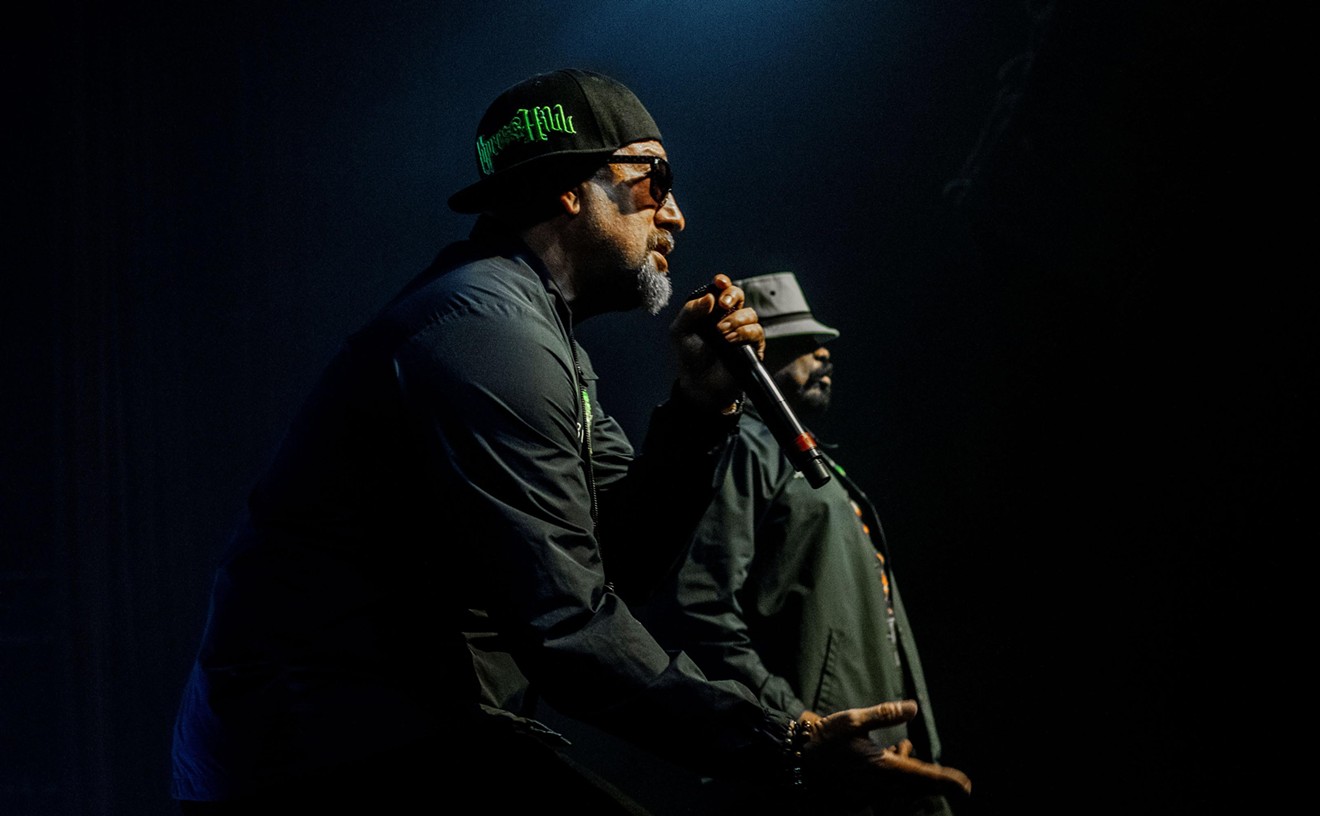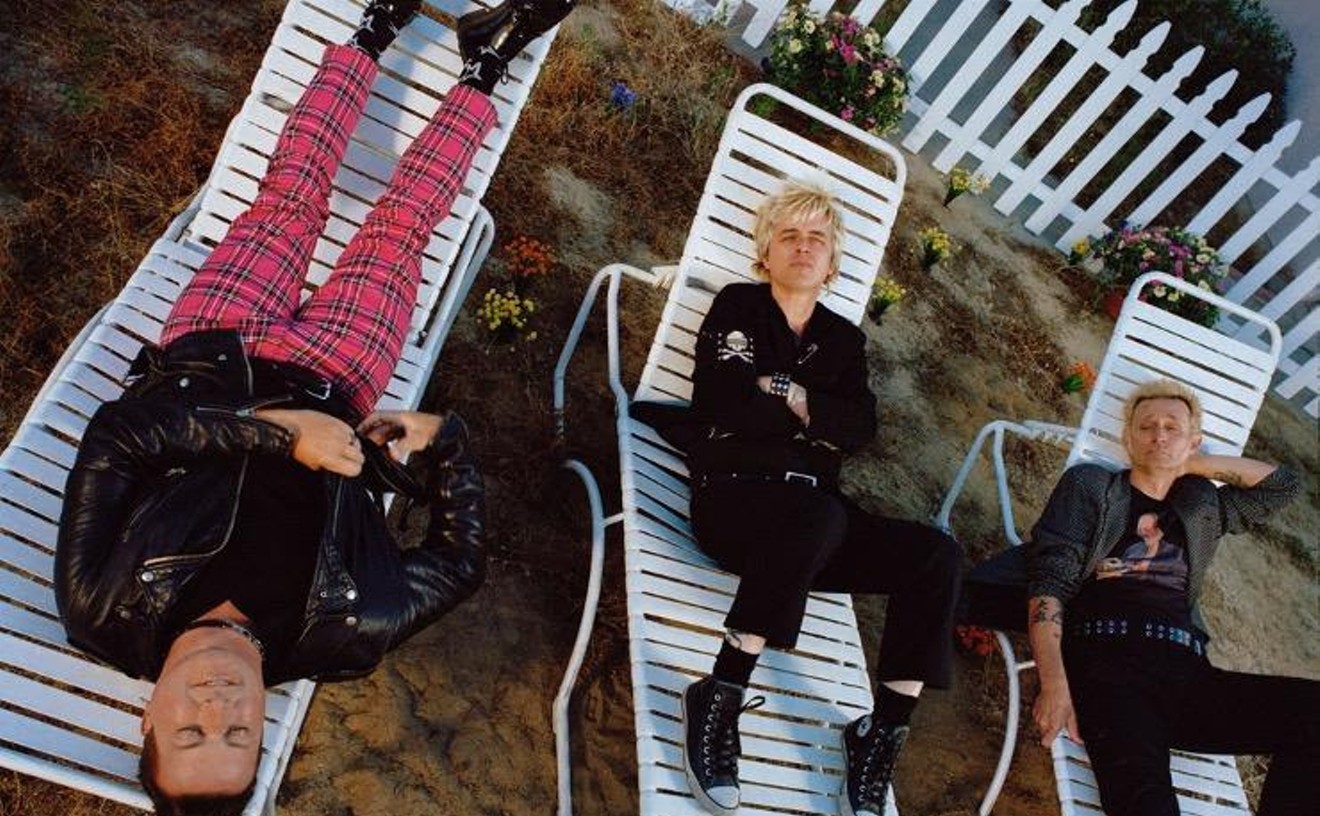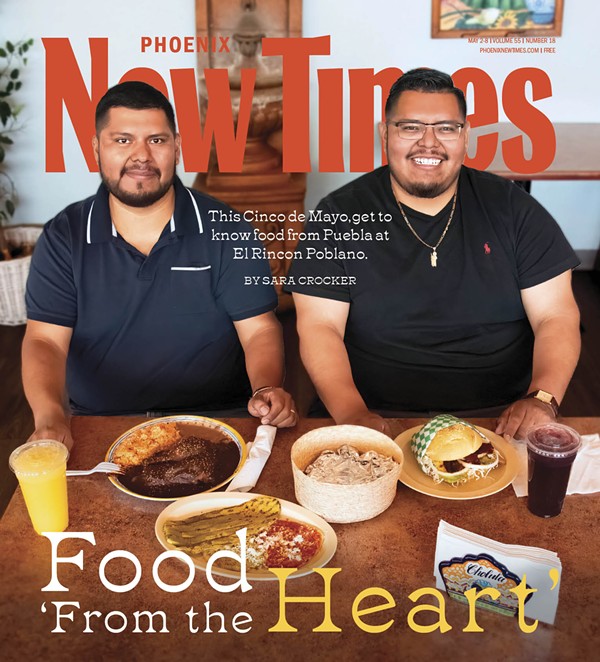This raw piece of camcorder verite is the kind of stuff that VH1's Before They Were Rock Stars is built on, embarrassing glimpses of famous performers before they had a clue. In this case, though, the source of the footage is not some back-stabbing old friend, but the Offspring's own home-video release, Americana.
There's nothing unusual about Holland's initial musical venture. It's basically the same as most successful musicians' first bands: shambling, unfocused and amateurish, with a naive tone of snotty self-satisfaction. That's not the weird part. The weird part comes later in the video, when you begin to hear a parade of Offspring "classics," tunes that have made their last three albums such sizable hits. Eventually, it hits you that 16 years after he started, Holland is still making shambling, unfocused music that relies on all-purpose snottiness to cover its rhythmic ineptitude.
That's what makes the Offspring's mammoth popularity so simultaneously fascinating and bewildering. At a time when even can't-miss guitar-rock bands (where have you gone, Billy Corgan?) are getting buried on the charts, the Offspring's latest album, Americana, remains in the Top 10 six months after its release and has already been certified triple platinum. What are these relentlessly mediocre Orange County losers doing right?
The Offspring's runaway success has inflamed the long-standing argument about what is or is not "real punk." At the Offspring's May 15 Desert Sky Pavilion show, the issue reared its head in various ways. For instance, near the end of an opening set by Mighty Mighty Bosstones, the Bosstones' singer Dicky Barrett dedicated a song "to all the rude boys and rude girls and the real punks out there." The largely teenage crowd roared as one, apparently convinced that they all fit the bill.
And maybe they were right. In any event, it seems pointless to argue whether the Offspring is a genuine punk band. It really depends on whether you define "punk" by a particular sound, or by an aesthetic. Is it more punk in 1999 to stubbornly cling to the old Black Flag template--like Sha Na Na doing '50s nostalgia at Woodstock--or to explore exciting new musical territory? Is it more punk to pay your dues playing the accepted indie circuit of clubs--as Sonic Youth's Thurston Moore once argued--or to cloister yourself away creating original sounds on your home four-track? Finally, does a punk band automatically cease to be a punk band if it gets massive radio and MTV play?
Of course, these are questions for smaller minds than ours, but if you really wanted to make a case that the Offspring are true punks, it wouldn't be that hard. They paid their dues at scruffy SoCal punk clubs, recorded their early albums for indie stalwarts Nemesis and Epitaph, and--for the most part--they've kept their music as fast and raw as it began.
Ultimately, it doesn't matter whether the Offspring are a punk band. The problem is not that the Offspring aren't punk, but that they are so completely devoid of wit and musical inspiration. From 1987 to 1994, the band's records were justifiably ignored by the masses, a situation that showed no sign of changing. But after Kurt Cobain's death in April 1994, alt-rock radio immediately turned to lightweight novelty tunes to lighten the cultural mood. A flood of bouncy joke songs by bands like Weezer and Presidents of the United States of America came spilling from the airwaves. The Offspring, journeymen desperate for a breakthrough, rode this wave of fluff with the novelty gang homage "Come Out and Play" (complete with a thickly accented chollo on the chorus), and they've since resorted to the cheapest imaginable gimmicks whenever their popularity appeared to be flagging.
At Desert Sky, gimmickry was a trick the Offspring used to distract people from their remarkably monotonous set list, in which every song sounded like a reprise of the one before. For instance, about halfway through the show, a deep, disembodied voice suddenly intoned: "Ladies and gentlemen, please welcome the Backstreet Boys." As the spiky-haired teens booed loudly, a recording of "Everybody (Backstreet's Back)" thundered from the speakers, and five Backstreet mannequins appeared onstage. The booing grew louder. Holland ran onstage brandishing a plastic red baseball bat and, one by one, he whacked the pseudo-Backstreets over the head like he was auditioning for a part in a GoodFellas sequel. The sad irony of the gesture was that the Backstreets' track was actually the most listenable piece of music heard during the set.
The move was typical Holland, who specializes in obvious overstatement, and who only takes on the safest targets. Take the band's recent, career-defining mega-hit "Pretty Fly (For a White Guy)." While the song inspired a reverent Spin magazine cover story--which lauded the Offspring for their supposedly dangerous, revolutionary take on racial politics--the protagonist of the song is such a moronic cartoon that absolutely no one could be offended.
Holland doesn't even bother to get his details halfway believable, maybe because that would mean alienating part of his demographic. Consider the following attack on a hip-hop poseur: "They didn't have Ice Cube, so he bought Vanilla Ice." What? Aside from the fact that it's been nine years since Vanilla Ice was a hot property, and that most white wanna-bes would be too self-conscious of their own hipness to consider buying such a thing, it's a positively cutting piece of social satire.
Of course, such matters didn't deter the Desert Sky zealots, who sang in unison to the song, right down to the screeching "Uh huh, uh huh" part that might be the most annoying moment in '90s rock.
Bad as "Pretty Fly" is, it provided one of the few moments in the show when the band seemed able to find a coherent rhythmic groove. Even with two percussionists, the band's rhythmic section was a train wreck, with drummer Ron Welty still unable--after 12 years--to execute the double-time, hard-core-punk beats that the band lives for.
Another rare example of rhythmic competence came with the band's current hit, "Why Don't You Get a Job?" The steel-drum intro and the touches of marimba on the bridge suggest that the band might be better suited for work as a Jimmy Buffett cover band than the hard-core angst-monger they insist on being.
Besides the song's grating a cappella intro ("My friend's got a girlfriend/Man he hates that bitch"), what sticks in the craw about this tune is how brazenly the band stole from other songs to create it. The chorus is a fairly obvious combination of The Beatles' "Ob-La-Di, Ob-La-Da" and Simon and Garfunkel's "Cecilia," but the bridge is the true shameless part. Holland lifts the entire bridge melody from Doris Troy's 1963 hit "Just One Look." Such hints of plagiarism are nothing new for Holland, who reworked Nirvana's "Smells Like Teen Spirit" riff for the idiotic "Self Esteem," and lifted his own "Come Out and Play" for "Pretty Fly."
Holland didn't say much during the Desert Sky show, but his few comments propagated the suburban, shopping-mall sense of rebellion that dominates his songs. Introducing the song "Walla Walla," Holland announced, "This is a song about prison. 'Cause going to prison's cool, right?" Halfway through the tune, the band brought out a pudgy friend dressed in penitentiary stripes, who danced around the stage and took the mike for a brief, cheesy "I'm innocent" routine.
One gets the perpetual sense that the Offspring jumped on the punk bandwagon at a point (mid-'80s) when the movement was increasingly overrun with obnoxious bullies who thought that the important thing was to be gross and snide at all times, regardless of the target. It's these types who are often cited by X's John Doe and Exene Cervenka as the people who destroyed the vibe of the early-'80s L.A. punk scene.
Consider the Desert Sky show's closing song, the Offspring's breakneck appropriation of Morris Albert's 1975 hit "Feelings." How ballsy can you get, taking on a forgotten one-hit wonder, 24 years after his only hit? Can't wait for that hard-hitting protest song about Gerald Ford.
The "joke" of "Feelings" is that Holland turns Albert's mushy declarations of love into strident expressions of romantic hostility. Here's a typical verse: "Imagine/Beating on your face/Trying to forget my/Feelings of hate." Hilarious, huh?
That's the way it goes with Holland. It doesn't matter what the subject is, as long as you say something angry, and say it loud. It's the Andrew "Dice" Clay school of rebellion.
It seems more than a coincidence that Holland so resembles Puck, the insufferable bike messenger who remains the most popular cast member ever on MTV's The Real World. It's as though Holland, and other like-minded cretins, have turned punk--which once was about a steadfast refusal to be absorbed by a hypocritical mainstream society--into a license to be as boorish as you wanna be. Basically, to be Puck.
It was obvious, particularly among the guys in the crowd, that punk has been reduced to rampant spitting, slamming, and saying "fuck" a lot. Punk is the smirking kid who sauntered through the aisles at Desert Sky in baggy jeans with "I Need to Get Laid" scrawled on his white muscle shirt, a $20 bill waving from his right hand.
In 1999, punk is the decadent frat house that you always hated. It's macho, sexist bullshit. It's mindless extreme-sports grandstanding. Let the Offspring have the use of the term. If that's what punk has been reduced to, who wants it










